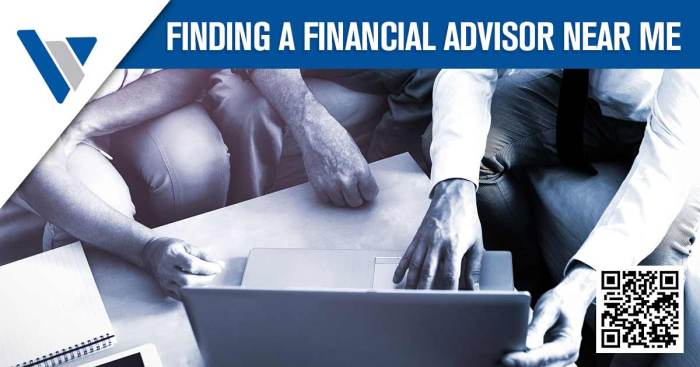Finding a Financial Advisor Near Me: Your Guide to Local Financial Guidance
Embark on a journey to discover the benefits of finding a financial advisor near you. From personalized services to face-to-face interactions, local advisors offer a unique touch to your financial planning.
Exploring the process of searching for the right advisor and understanding the factors to consider can lead to a fruitful partnership that secures your financial future.
Why Find a Financial Advisor Near Me?

When it comes to managing your finances, having a local financial advisor can offer numerous advantages. Here's why finding a financial advisor near you is beneficial:
Importance of Having a Local Financial Advisor
A local financial advisor is familiar with the economic landscape and financial regulations in your area, allowing them to provide tailored advice based on your specific circumstances.
Personalized Services from a Nearby Advisor
By working with a financial advisor in close proximity, you can enjoy personalized services that take into account your individual goals, risk tolerance, and financial situation. This personalized approach can help you achieve your financial objectives more effectively.
Benefits of Face-to-Face Meetings with a Local Advisor
Meeting with a financial advisor in person can foster a deeper connection and understanding between you and your advisor. Face-to-face meetings allow for clearer communication, the opportunity to ask questions directly, and the chance to build a trusting relationship with your advisor.
How to Search for a Financial Advisor Near Me
Finding a financial advisor near you can be a crucial step in managing your finances effectively. Whether you are looking for investment advice, retirement planning, or budgeting assistance, having a local advisor can offer personalized support. Here are some tips on how to search for a financial advisor near you:
Using Search Engines
Search engines like Google can be a valuable tool in finding local financial advisors. Simply type in s like "financial advisor near me" or "financial planner in [your city]" to generate a list of potential advisors in your area. Make sure to visit their websites, read reviews, and check their credentials before contacting them.
Online Directories
Online directories specifically designed for financial advisors, such as the CFP Board's search tool, can help you narrow down your options based on location and specialization. These directories often provide detailed profiles of advisors, including their areas of expertise and contact information, making it easier for you to find a suitable match.
Asking for Recommendations
Another effective way to find a financial advisor near you is by asking for recommendations from friends, family, or colleagues who have worked with advisors in the past. Personal referrals can offer valuable insights into an advisor's communication style, approach, and overall satisfaction with their services.
Don't hesitate to reach out to your network for trusted recommendations.
Factors to Consider When Choosing a Financial Advisor
When selecting a financial advisor, it is crucial to consider various factors to ensure you find the right fit for your financial goals and needs. From credentials to fee structures, each aspect plays a significant role in determining the effectiveness of your partnership with an advisor.
Important Criteria for Choosing a Financial Advisor
- Credentials:Look for advisors with relevant certifications such as Certified Financial Planner (CFP) or Chartered Financial Analyst (CFA). These credentials indicate a certain level of expertise and professionalism.
- Experience:Consider the advisor's years of experience in the industry and whether they have dealt with clients in similar financial situations as yours.
- Specialties:Some advisors specialize in particular areas such as retirement planning, estate planning, or investment management. Choose an advisor whose specialties align with your financial needs.
Significance of Fee Structures and Compensation Models
- Fee-Only vs. Commission-Based:Understand how the advisor is compensated. Fee-only advisors charge a flat fee or a percentage of assets under management, while commission-based advisors earn commissions from selling financial products. Consider which model aligns with your preferences.
- Fee Transparency:Ensure transparency in fee structures and understand all costs involved. Hidden fees can significantly impact your overall returns.
Importance of Compatibility and Trust with an Advisor
- Personal Connection:Building a strong relationship with your financial advisor is essential. You should feel comfortable discussing your financial goals and concerns openly.
- Trustworthiness:Trust is a key factor in any advisory relationship. Ensure that your advisor acts in your best interests and provides unbiased advice that aligns with your goals.
Meeting a Financial Advisor in Person

When meeting a financial advisor in person for the first time, it is essential to be prepared and have a clear understanding of what to expect during the meeting. This initial consultation is crucial in establishing a relationship with the advisor and laying the foundation for future financial planning.
What to Expect During the First Meeting
During the first meeting with a financial advisor, you can expect to discuss your financial goals, current financial situation, risk tolerance, and investment preferences. The advisor will ask you questions to gather information about your financial background and objectives. They will also explain their services, fees, and investment approach.
This meeting is an opportunity for you to get to know the advisor and determine if they are the right fit for your financial needs.
Tips on Preparing Questions to Ask the Advisor
- Come prepared with questions about the advisor's experience, qualifications, and areas of expertise.
- Ask about the advisor's investment philosophy and how they will help you achieve your financial goals.
- Inquire about the advisor's fee structure, including how they are compensated for their services.
- Discuss how often you will meet with the advisor and how they will communicate with you regarding your investments.
- Be sure to ask about the advisor's approach to risk management and how they handle market fluctuations.
Importance of Bringing Relevant Financial Documents to the Meeting
It is crucial to bring relevant financial documents to the meeting with your financial advisor. These documents may include bank statements, investment account statements, tax returns, insurance policies, and any other financial information that will help the advisor understand your financial picture.
By providing these documents, you will enable the advisor to assess your current financial situation accurately and tailor their recommendations to meet your specific needs.
Outcome Summary

In conclusion, finding a financial advisor near you not only ensures personalized guidance but also establishes a strong foundation built on trust and compatibility. Take the first step towards financial security by connecting with a local advisor today.
General Inquiries
Why is it important to have a local financial advisor?
Having a local financial advisor allows for personalized services tailored to your specific needs and enables face-to-face meetings for a more personal touch.
What are the key factors to consider when choosing a financial advisor?
Important factors include credentials, experience, specialties, fee structures, compensation models, and the importance of compatibility and trust.
What should I expect during the first meeting with a financial advisor?
During the first meeting, you can expect to discuss your financial goals, ask questions, and bring relevant financial documents for review.




